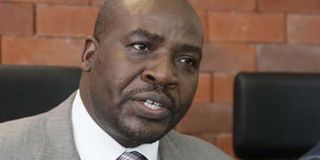KNCHR to monitor campaigns

Kenya Human Rights Commission vice-chairman George Morara. The commission will monitor political campaigns ahead of the August elections. PHOTO | MARTIN MUKANGU | NATION MEDIA GROUP
What you need to know:
- KNCHR has already trained 120 members of their staff to join 84 other elections monitors.
- The commission wants the court to clarify the matter on the Chapter Six of the Constitution, which focuses on integrity.
The Kenya National Commission on Human Rights (KNCHR) will closely monitor political campaigns ahead of the August 8 General Election.
Speaking in Naivasha on Wednesday evening, commission vice-chairman George Morara said the group wants to ensure free, fair, peaceful and credible general elections.
He said some of the things they will be monitoring is whether there is a level playing ground for all candidates.
“For instance, we want to ensure a fair (media) coverage for all the political parties involved in the campaigns,” said Mr Morara.
He said KNCHR has already trained 120 members of their staff to join 84 other election monitors, who have been dispatched to counties.
CONFLICTS
He highlighted possible areas of conflicts, including campaign venues, and called for an elaborate plan to ensure rival political groups do not clash at such places.
“In the past, we have witnessed clashes over meeting venues and we don’t want to have a repeat of that,” said Mr Morara.
He called on the Independent Electoral and Boundaries Commission to ensure it has a clean voter register ahead of the elections.
“We don’t want to have challenges like those witnessed during the 2013 elections,” he asserted.
He stressed that the commission wants the courts to clarify the matter on Chapter Six of the Constitution, which focuses on integrity.
“We want the same standards to be applied even for those seeking to occupy political offices,” said Mr Morara.
He questioned the rationale of subjecting those seeking political office “to much lower standards” unlike those being appointed to various public offices.
He said candidates for elective positions were being vetted based on “criminal standards as opposed to ethical standards.”





